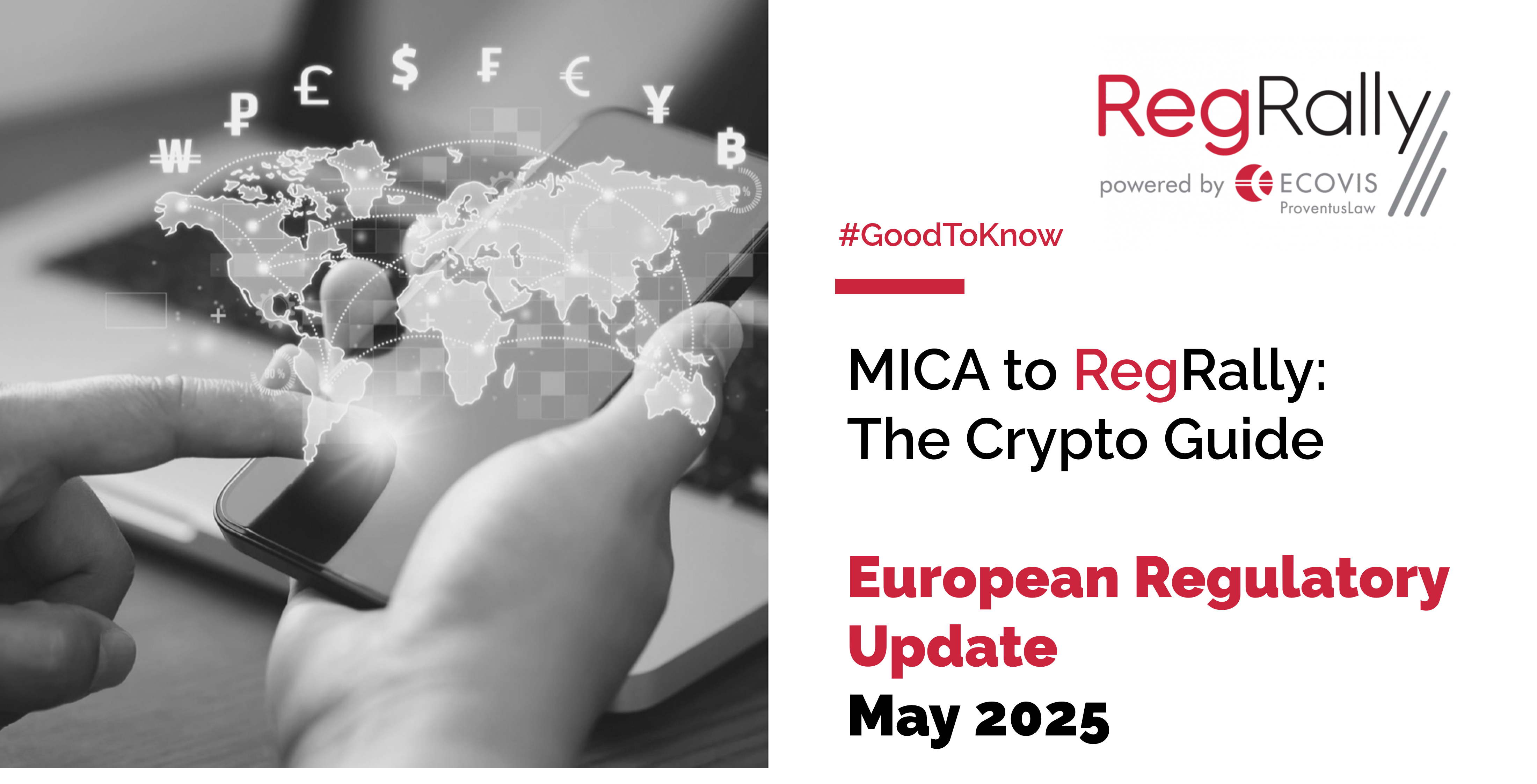ECOVIS ProventusLaw brings a curated selection of significant developments from the European crypto regulatory landscape. It provides viewers with a look at what’s ahead and high-profile insights into the ever-changing crypto industry.
The Parliament of the Republic of Lithuania has officially approved postponing the implementation deadline for the Markets in Crypto-Assets (MiCA) Regulation. The original date of 1 June 2025 has now been extended to 1 January 2026.
This extension grants VASPs operating in Lithuania an additional six months to obtain authorisation and fully comply with MiCAR requirements. While the extension offers welcome flexibility, it’s important to note that the licensing process typically takes between 6 and 12 months. We strongly encourage all market participants to begin preparations soon to avoid last-minute bottlenecks.
If you need guidance or legal support in navigating MiCAr licensing or compliance matters, our team is here to help.
Internal Audit – A Must for Crypto Compliance
Under the Bank of Lithuania rules, Internal Audit is not optional. It’s a key safeguard for crypto companies—ensuring your controls, governance, and compliance are regulator-ready. ECOVIS offers deep, hands-on audit expertise tailored to the crypto space. Trust the team that knows the tech and the rules. More on internal audit.
Bank of Lithuania Warns Against Illegal Crypto Platform LWEX
The Bank of Lithuania has flagged the LWEX cryptocurrency platform as operating illegally in the country and posing a high risk of financial loss. LWEX lacks authorisation to provide investment or crypto services and may exhibit signs of a pyramid scheme. The public is urged to avoid unlicensed platforms, verify providers on the Bank’s website, and be wary of offers promising high returns with minimal risk.
ESMA Clarifies MiCA Crypto Service Rules for AIFMs
The European Securities and Markets Authority (ESMA) has clarified that registered AIFMs (sub-threshold AIFMs) are not eligible to offer crypto-asset services under Article 60(5) of the Markets in Crypto-Assets Regulation (MiCA). Only authorised AIFMs and UCITS management companies may use the simplified notification process to provide such services.
Key Points:
- Article 60(5) MiCA allows authorised AIFMs/UCITS managers to offer crypto services with 40 working days’ prior notice.
- Registered AIFMs fall under a lighter regime and are excluded from this provision.
- To offer crypto-asset services, registered AIFMs must first obtain full AIFMD authorisation.
- Firms must determine their AIFM status and avoid unlicensed crypto activities to prevent regulatory breaches.
EBA Proposes Rules on Central Contact Points for Crypto Service Providers
The European Banking Authority (EBA) has released draft Regulatory Technical Standards (RTS) detailing when crypto-asset service providers (CASPs) must appoint a central contact point (CCP) to bolster anti-money laundering and counter-terrorist financing (AML/CFT) compliance in cross-border operations.
Key Points:
- CASPs offering services in another EU country through a local presence (e.g. crypto ATMs) must comply with both home and host state AML/CFT rules.
- In such cases, they may be required to appoint a CCP to support local supervisory efforts and reduce financial crime risks.
- The RTS clarify the conditions, roles, and responsibilities of CCPs but leave flexibility on their form and location within the EU.
- The CCP mechanism aims to improve AML/CFT oversight and coordination across Member States.
ESMA Clarifies MiCA’s Application to Copy Trading in Crypto
The European Securities and Markets Authority (ESMA) has issued guidance on how copy trading and auto trading services involving crypto-assets should be assessed under the Markets in Crypto-Assets Regulation (MiCA).
Key Points:
- MiCA does not explicitly define copy or auto trading, so services must be assessed case-by-case to determine the applicable crypto-asset service(s) involved.
- Depending on their design, such services may qualify as portfolio management or investment advice under Article 3(1)(16) MiCA.
- ESMA advises applying MiFID II principles to crypto copy trading, adapted for the MiCA framework, to ensure consistency in supervision.
ESMA Issues Final Guidelines to Tackle Market Abuse Under MiCA
The European Securities and Markets Authority (ESMA) has published final guidelines to help national competent authorities (NCAs) prevent and detect market abuse in crypto-asset markets under MiCA, covering insider dealing, unlawful disclosure, and market manipulation. These rules promote consistent, risk-based supervision across the EU and take effect three months after publication.
Key Points:
- NCAs must allocate dedicated staff and ensure ongoing training in digital finance.
- They should coordinate with AML bodies and consumer protection agencies.
- Monitoring must combine on-chain/off-chain data, including social media, using both automated tools and human analysis.
- Crypto market participants (PPAETs) must maintain and adapt surveillance systems to evolving risks.
Bank of Lithuania Updates Seimas on Crypto Licensing Progress
On April 28, 2025, the Bank of Lithuania informed the Seimas Committee on Budget and Finance about the ongoing licensing of cryptocurrency service providers. The Chairman of the Board and the Head of the Licensing Department reported that 12 applications are currently under review as part of efforts to ensure compliance with the regulatory framework, signaling continued progress in formalizing the crypto sector.


 Newsletter Subscription
Newsletter Subscription